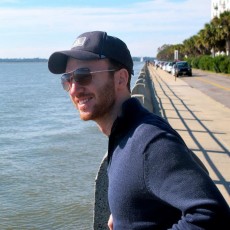 Social Sciences
Social Sciences
Data-Driven

If Shane Lofgren’s life was like a movie, someone would have pulled him aside after his high school graduation and said, “I just want to say two words to you. Just two words.
“Liberal arts.”
No one did, of course. College isn’t like a movie, whether it’s The Graduate or Animal House. So chalk it up to foresight or just plain luck that Lofgren (pictured) landed in the College of Arts and Sciences at the UO.
He graduated in 2011 with a bachelor’s degree in economics. But on the way Lofgren also studied ethics, poetry, international studies, creative writing and history. Now, guess what he’s doing today.
Score two points if you guessed analytical bioinformatics.
That’s right. You can study history, economics, ethics and poetry at the UO and land a career doing research on potential new cancer treatments at Stanford. Lofgren did.
And he never even took biology.
What he did take, though, prepared him for just about anything. History in particular not only gave him perspective, it helped teach him how to analyze, see patterns, form concepts and construct arguments. It taught him how to think.
“Having those history classes and the great courses I took at the UO helped open my mind,” Lofgren said. “They gave me the ability to see facts and generate useful narratives and models. They gave me the ability to write.”
History, of course, is much more than just dates and places. In assistant professor Reuben Zahler’s classes, Lofgren was pushed to dig for information, find new ways to interpret it and lay out his case in clear, concise language.
In his job at the Department of Biomedical Informatics at the Stanford School of Medicine, Lofgren combs through massive amounts of data on diseases, existing drugs and outcomes, in search of connections that could lead to breakthrough treatments. The goal is to find a treatment that works well for a particular aspect of one illness, say inflammation from lupus, and see if there are other diseases that have a similar characteristic, such as cancer, that could be treated the same way.
Thanks to what he learned from Zahler, Lofgren can whip out a bullet-point outline for a research paper and complete it in no time at all. His colleagues with advanced science degrees, on the other hand, sometimes spend weeks or even months writing a paper and enjoy not a minute of it.
“The most directly relevant benefit of the study of history was the practice it gave me with the crucially important skills of filtering an excess of facts and data and assembling salient points into meaningful and useful narratives,” Lofgren wrote, in an e-mail to Zahler. “This is actually an incredibly important skill in science.”
Zahler wasn’t surprised that a student studying the “soft sciences” might end up working in the “hard sciences.”
“A liberal arts education is a way of thinking about humanity—or how humans relate to the world—that doesn’t always accept the accepted wisdom, that is constantly thinking of questions that challenge accepted thought,” Zahler said. “It always assumes that we have very deeply profound assumptions that may be wrong. And in the business world, that is a very important way of viewing reality.”
―Greg Bolt


 Twitter
Twitter Facebook
Facebook Forward
Forward